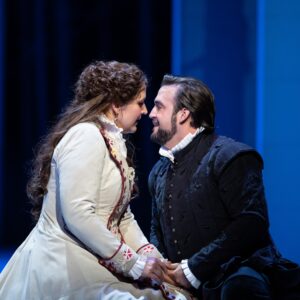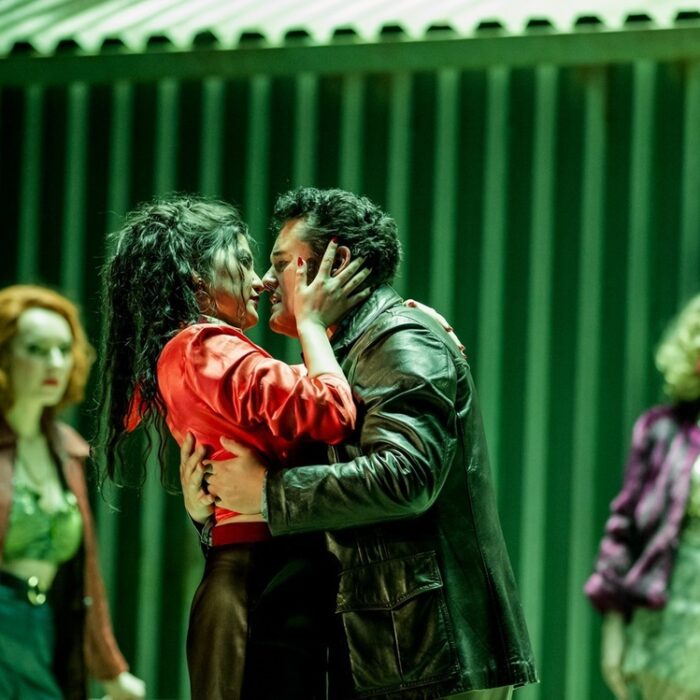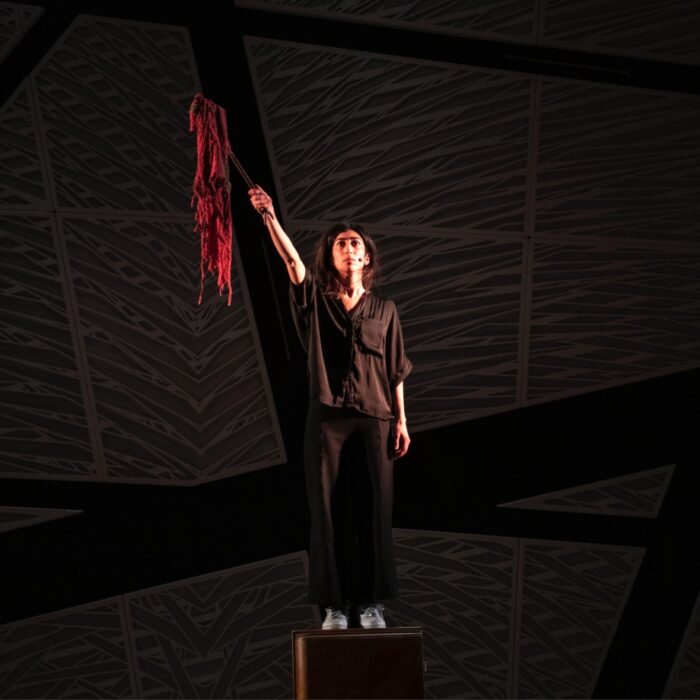
Opera, especially Grand Opera, has always had a predilection for throwing up stories that test the boundaries of credibility and border on indelicacy, and Verdi operas frequently bask in both.
“Don Carlo,” one of Verdi’s later works although arguably written whilst in his prime, is a truly convoluted tale, mostly fictional although involving true historical figures, that involves conflict, war, Royalty, loyalty, politics, religion, the Spanish Inquisition and a somewhat uncomfortable love affair that is presented here as being almost incestuous.
In fact, the history of the opera itself is almost as complex as the tale it tells, Its FIVE acts having been written, rewritten, and shortened at various stages through its inception and earlier development. Even its name, “Don Carlo” has been performed as “Don Carlos,” dependent on the language it was staged in. Verdi composed, augmented, and revised the opera in the French language and there are those that assert that the Italian translation he authorized is somewhat inferior to its original French. In fact, so problematic was the work, that this opera lay dormant in the vaults, hidden away for the first half of the 20th Century until the Metropolitan Opera staged it in 1950.
Throw in that, at close to four hours long, combined with the fact that, for many, it has little by way of the melodic ‘hit tunes’ that highlight much of Verdi’s other works, “Don Carlo” can be something of an acquired taste. It’s probably not the best opera for the casual visitor, probably not for a first time opera goer, and certainly requiring way more than one experience to appreciate and acknowledge its majesty.
For a lot of this work is, indeed, majestic. I have always opined and insisted that opera should ALWAYS be about the voice and the music, first and foremost, and despite having already intimated that some of this opera’s music may not be as melodious in contrast to Verdi’s other masterpieces, this production manages a fine assembled cast of voices.
Stars of the Show
It wouldn’t surprise me in the least if the stall-holders in Covent Garden’s East Colonnade Market didn’t catch some of Lise Davidsen’s most ardent endeavors during her performance. The Norwegian soprano, here in the role of Elisabeth of Valois, her first Verdi role, has the most voluminous voice I have ever heard.
That’s not to say, however, that it isn’t an instrument of beauty. She has an astonishing dynamic range, with subtle phrasing and expression in the lower and middle registers. But there is a key point in her passaggio where her emanations take on an almost supernatural life of their own that resonate and ping off every surface of the auditorium, a quite astonishing experience to witness in the flesh.
Her opening act aria and duet, ‘Di quale amor, di quanto ardor’ with her true love, Carlo, was measured and contained, sung with sweet expressiveness and girlish enthusiasm. Her sorrowful aria to her lady-in-waiting whom the king orders to return to France, “Non pianger, mia compagna,” is especially moving.
Her final act “Tu che la vanità,” however, is quite an astonishing display of the vocal capabilities which made surmounting this most demanding of arias seem effortless. Here, she employs beautiful heart-rending diminuendos, evocative phrasing, and astonishing amplitude to great effect. The aria, rightly, elicited a long bout of applause from the spellbound audience and was the inarguable highlight of the evening. Davidsen also gives a performance of fine interpretative skills, convincingly portraying the transformation from a carefree, enamored young woman in the first scenes to pious, reluctant but loyal wife to the king, to finally adopting a solemn stoicism in the final acts, borne of her inner torment and overwhelming sense of duty.
In my interview with American tenor Brian Jagde earlier this year, I asked him about the upcoming role of Don Carlo. He told me: “He’s a weak character a lot of the time. He complains a lot about the fact that he’s heartbroken, and in almost all of the text, he sings: “I’m miserable. I’m so sad.” It’s a weak personality trait to have as a character, with no positivity at all. When I see a character like that, my goal is to find the strength. It’s challenging, really challenging. It’s also based on a real person, but the story is obviously fictitious. I look forward to it. I want to bring in something new. What am I going to do that’s different from other singers?”
Jagde cuts a dashing figure and, for me, he possesses a wonderfully natural stage presence. Although his tale is, indeed, a miserable woeful one, he portrays the role here without any real, overt sense of wretchedness or weakness, managing at times to genuinely evoke feelings of empathy and even sympathy for his plight. If that is what he intended when he said he wanted to do something different from other singers, he achieved his aims handsomely.
For a significant period of time he trained as a baritone at the beginning of his career and his voice, unquestionably, has a rich, dark, baritonal quality in the lower and middle registers. But when he transitions through the upper passaggio his voice takes on a most stentorian form, beautifully clarion. He is, for me, redolent at times of the great Canadian tenor, Jon Vickers, displaying the same heroic timbre during certain passages.
He started, I thought, a tad cautiously but his “Io la vidi e il suo sorriso,” became more fervent, his instrument soaring effortlessly through the upper register.
As the evening progressed, he tangibly grew stronger and more assured. His duet with his loyal friend, Rodrigo, “Dio che nell’alma infondere” duet where they affirm their friendship and commitment was splendidly rousing and Jagde sings with great warmth and sentiment here.
His reactions after singing the second act ‘Sei tu, sei tu, bell’adorata’ where his character believes himself to be singing to his beloved Elisabeth is genuine, if unintentionally, funny upon realizing it is Princess Eboli when she unveils herself. His response of revulsion, though comical, is almost justifiable and wholly convincing.
His final act “Ma lassù ci vedremo in un mondo migliore” duet with Elisabeth is sung beautifully with great conviction and he unequivocally fulfilled his ambitions to find strength in this character, in my opinion. He even gets to partake in a pretty deft sword fighting sequence, channelling his inner Erroll Flynn!
The problem with Verdi’s story here, is that Don Carlo is effectively telling the woman of his dreams, the object of his desires, the source of his turmoil and anguish, the focus of his unrequited love……. that he no longer desires her, and that he now loves her as a son loves his mother. Whilst I understand that, of course, Elizabeth is only his stepmother, I none-the-less can’t fully suppress the notion that Friedrich Schiller, on whose play Verdi based his opera, had something of an Oedipus complex.
Strong Support
True love does not, at any point, run smoothly for anyone in this tale and it is ironic that the most emotionally charged, poignant, and affecting scenes take place between Don Carlo and his friend and ally, Rodrigo the Marquis of Posa, in quite possibly the best epitome of a bromance one could ever find. Italian baritone Luca Micheletti gets to grips as Rodrigo and he carries himself here with a quiet, unassuming assuredness that creates suitable suspicion in the audience as to his motives. There’s nothing ambiguous about the voice here, though. He sings with very fine limpidity and suaveness, observing a beautiful legato. I have already referred to his rousing duet with Don Carlo, and his rich baritone colors blend well with Jagde’s tenor throughout all of their interactions. But it is in his final scenes, where he visits his old friend in prison, reaffirming his love and allegiance to Don Carlo, and his own, subsequent death, where he gets to shine. His impassioned “Per me giunto è il dì supremo,” and “O Carlo, ascolta” are exquisite, especially the latter where he employs a mellifluous, sotto voce on certain passages in his dying moments. It makes for an intensely emotive scene.
Yulia Matochkina is Princess Eboli, the lady in waiting to Elizabeth and madly in love with Don Carlo. She is a beautiful, visually alluring mezzo-soprano made up here to be something of a harridan. There is, however, no disguising the beauty of her voice. She applies the right amount of pompousness in her “Nei giardin del bello” and cements her role as part villain when she swears vengeance in her “Al mio furor sfuggite invano,” having been rejected by Don Carlo. However, her “O don Fatale” not only redeems her character with her compassion, but the aria enables her to show off her rich, wide palette. She sings most expressively here with full, sonorous top notes and with an emotion-laden, dark but velvet lower register. Her aria received deserved warm applause.
Canadian bass John Relyea plays a very austere, King Philip II, moving with just the right amount of brooding menace. His lustrous, smooth, dark timbre convincingly portrays his rancorous persona, and he is downright ruthless, if not cruel, in the effecting of his duties as both King and husband. However, he gets to inject some beautifully dulcet qualities into his fourth act aria “Ella giammai m’amò” where he laments that the Queen never loved him. He utters the final phrase “No, quel cor chiuso m’è, amor per me non ha!” with such heartfelt conviction that it is impossible not to sympathize with his plight. Again, the audience reciprocated with warm applause.
If King Philip conveyed brooding menace and austerity, then Ukranian bass Taras Shtonda, in the role of the Grand Inquisitor, is downright creepy, quite possibly among the most fearsome roles one could encounter. Blind, and requiring the assistance of two hooded monk-like figures to escort him everywhere, his character positively drips evil forebodings. His interactions with the King are most compelling, and his cavernous, inky black bass conveys his malevolence to perfection.
Two other soloists that merit a mention, firstly Canadian soprano Sarah Dufresne who plays the very aptly named “Voice from heaven,” given her divine performance. She is heard at the end of the third act where she sings “Volate verso il ciel, volate, povere alme, volate a goder la pace del Signore.” A single passage, but sung with such sweet, angelic intonation that it compels one to wish to hear more. A member of the Jette Parker Artists Programme in the 2022-23 season, she is unquestionably destined for great things.
Scottish tenor Michael Gibson is a member of the same artist program and is becoming something of a Royal Opera House stalwart. He takes the role of Count of Lerma here, a minor role, predominantly in this performance to notify the would-be lovers, Don Carlo and Elizabeth, that their love is doomed by virtue of her requirement to marry King Philip, in order to quite literally keep the peace. He sings with a most pleasant tenor voice, to my ear a light lyric tenor, and it must be surely a question of time until he is appearing in greater, more demanding roles.
The Royal Opera House chorus, under the direction of William Spaulding, is quite majestic and its contributions to this ambitious score is profound at times.
Minimalism
Likewise, French conductor Bertrand de Billy shows immense skill here, coordinating and controlling, very tightly, which at times is a difficult composition. His orchestra responds with magnificence, with wonderful solos at key moments, and by combining to augment and accentuate the drama and passion with delicious preludes and interjections. The sublime music IS here in “Don Carlo,” you just have to sometimes listen out for it.
A dark, foreboding drama calls for dark, foreboding scenery, and in Bob Crowley’s designs you have a lot of predominant blood red and blacks, not just in the oppressive sets that insinuate incarceration, but also in the 16th-century costumes. Act one has some aesthetically pleasing conifer trees, but the snow-laden ground is patently white sheets, made obvious by virtue of a large section of them being rucked up in a corner. Minimalism was the order of the day for much of the other acts, with simple printed drop sheets, cardboard cut-outs, single-item furniture, and in some scenes, basically a bare stage. The gold cathedral and the tomb of Carlo V are impressive enough, alas.
Lighting director Mark Henderson does a splendid job, enhancing the mood and dramatic intensity with judicious use of slanting light, evocative shadows, and isolated illumination that heightens the sense of claustrophobia.
Kudos, also to fight director Terry King. I have already touched on the sword antics of the final act, and it is generally very difficult to implement such material into any drama, convincingly, without the performers having undergone a lot of training and practice. That they did so here and finished on the right side of credibility suggesting a skilled instructor and/or gifted students.
This is the fourth revival of director Nicholas Hytner’s production, first shown in 2008. The third act courtyard scene in front of the grand cathedral, where the public ceremony is being held to celebrate the execution by burning of the heretics, includes a Royal procession, is so cluttered and confusing I genuinely had no real notion of what was supposed to be occurring. This act had the potential ingredients to make this the visually spectacular event of the whole evening. Presumably, health and safety concerns dictated that there would be no major fire-lighting antics and the Spanish Inquisition would not be burning their offenders on this occasion.
From a staging point of you, one is left with the distinct impression that the purse string holders have no more to give and that this production, irrespective of how many more incarnations it will make, will simply have to make do with what it has.



